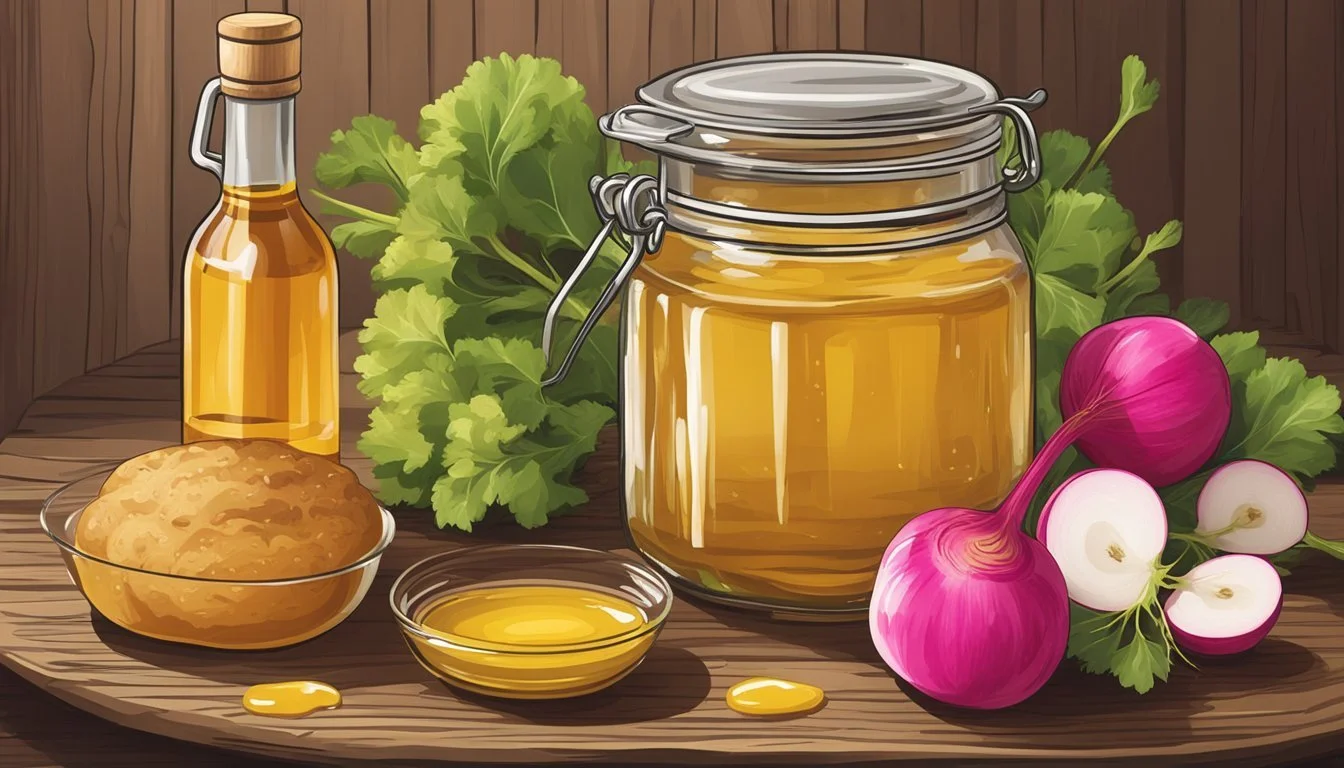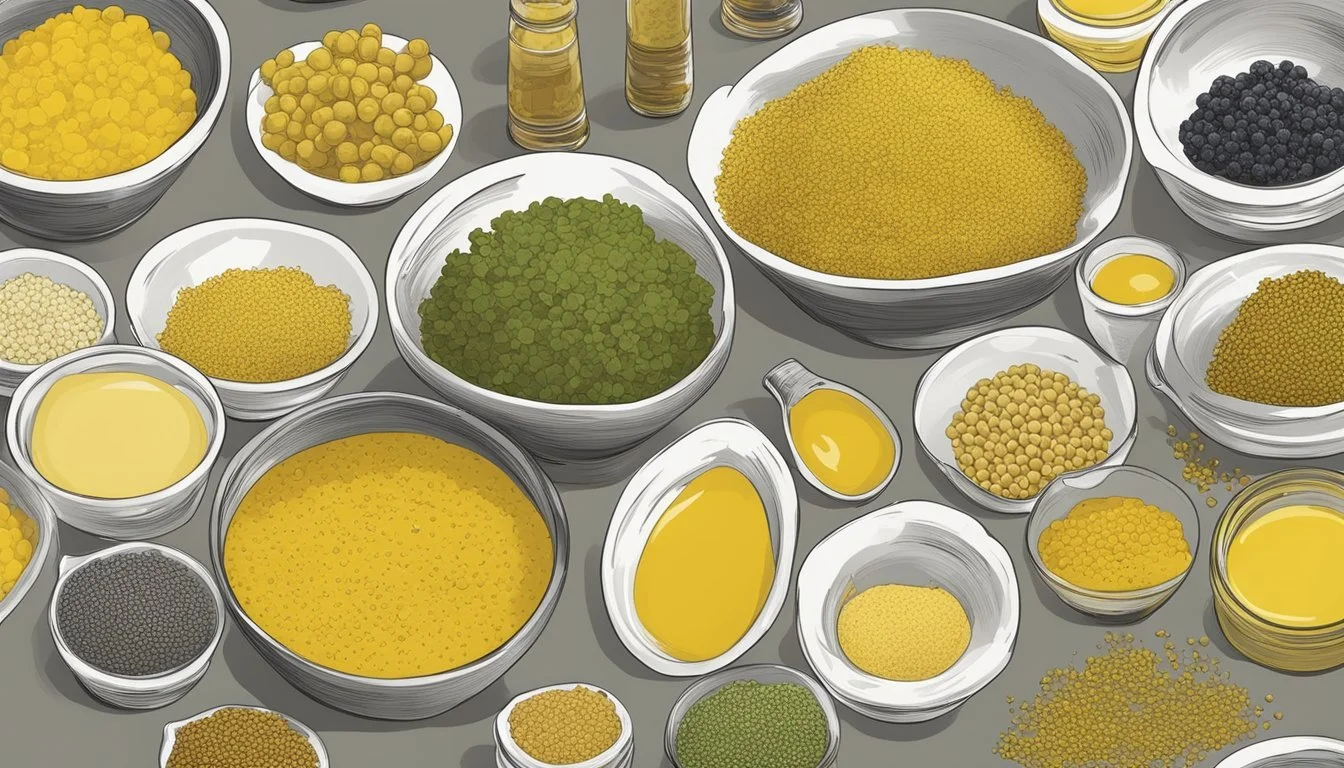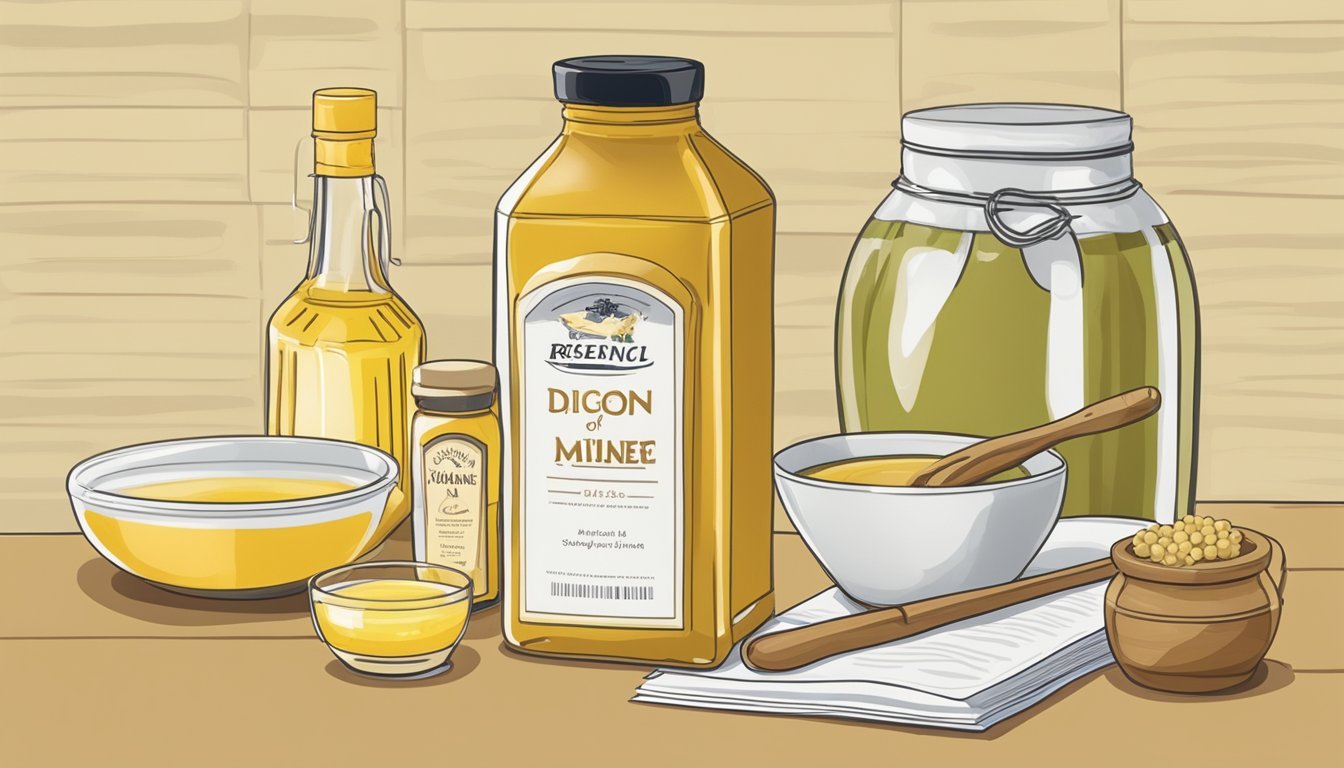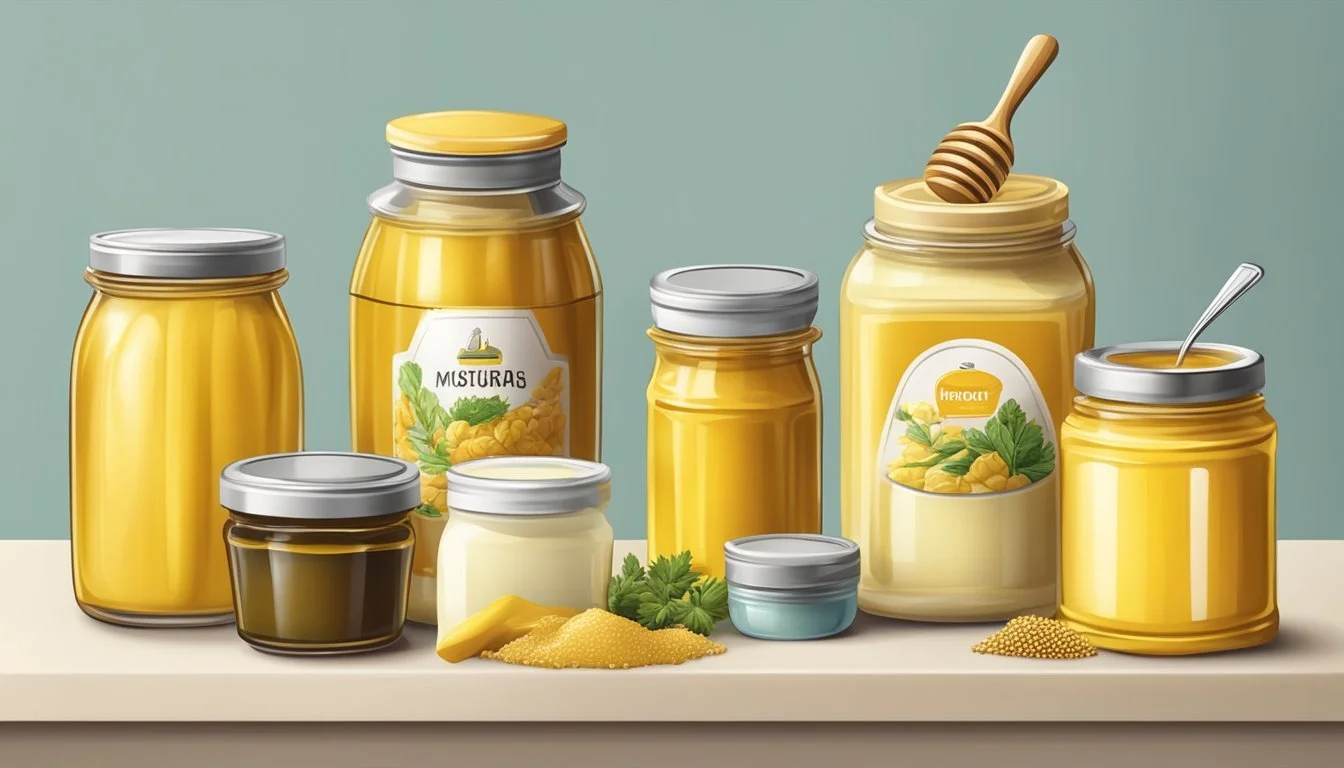French Mustard Substitutes
Top Alternatives for Your Recipes
French mustard, particularly Dijon mustard, is a staple ingredient in numerous recipes, known for its distinct tangy, sharp, and slightly spicy flavor profile. Originating from the Dijon region of France, this variety of mustard is irreplaceable in classical French cuisine and is used in vinaigrettes, marinades, and as a condiment. However, there are occasions when Dijon mustard may not be readily available, or dietary preferences necessitate a substitute. Understanding viable alternatives that can mimic its characteristics is essential for both home cooks and professional chefs to maintain the integrity of their dishes.
Substitutes for Dijon mustard need to offer a similar balance of acidity and spiciness to ensure the outcome of a recipe remains consistent. Stone-ground mustard, with its comparable texture and flavor, is often recommended as the closest substitute. This mustard variety, which incorporates whole mustard seeds, provides a similar pungency and depth. In a pinch, other mustards, such as yellow mustard, can be used, keeping in mind that it typically presents a milder flavor and less complexity than Dijon.
In recipes where mustard's primary role is to emulsify or add acidity rather than flavor, alternatives may extend beyond condiments to items such as white wine vinegar or even mayonnaise in specific contexts. Each replacement carries its unique qualities; thus, the choice of substitute will vary based on the requirement of the dish and the desired end result. It is important to adjust quantities and expectations accordingly to achieve a balanced and appealing flavor.
Understanding Mustard Varieties
In the diverse world of condiments, mustard plays a versatile role with its varying flavors and textures. This section explores the specific characteristics of French Dijon mustard, the different types of mustard seeds, and how each category of mustard is best utilized in cooking and food preparation.
Characteristics of French Dijon Mustard
French Dijon mustard is known for its creamy consistency and sharp, tangy flavor profile. Made predominantly from brown mustard seeds, wine, and unfermented grape juice known as ‘verjuice’, Dijon mustard offers a delicate balance of acidity and spiciness. Its smooth texture and piquant taste make it an excellent emulsifying agent in dressings and a fine tenderizing ingredient for marinades.
Different Types of Mustard Seeds
The mustard plant yields three principal types of seeds: white, brown, and black. White mustard seeds are the mildest, contributing to the subtle flavors of yellow mustard. Brown mustard seeds possess a spicier quality and are often used in Dijon and spicy brown mustard. The black mustard seeds are the most pungent and are less commonly found in commercial mustards due to their intense flavor.
Major Mustard Categories and Their Uses
Mustards are categorized into several distinct types based on their preparation methods and flavor profiles:
Yellow Mustard: Typically made with white mustard seeds, turmeric, and vinegar, providing a mellow tang and bright color.
Spicy Brown Mustard: Utilizes brown mustard seeds and varying spices to achieve a robust flavor, suitable for sandwiches and savory dishes.
Honey Mustard: Combines the mildness of mustard with the sweetness of honey, commonly used as a dipping sauce or glaze.
Each type of mustard offers unique culinary advantages, from the gentle heat of honey mustard to the pronounced zing of Dijon, enhancing the flavor of a broad range of dishes.
Why Substitute Dijon Mustard?
In culinary endeavors, the choice to substitute Dijon mustard may arise due to various factors that affect its use in recipes. Deciding on an alternative can depend on the availability of Dijon mustard, specific dietary considerations, or even personal taste.
Availability and Convenience
Dijon mustard, which originates from France, might not be readily available in every local grocery store, especially outside of Europe. Additionally, due to its distinct flavor and artisanal production, it might be more expensive or less convenient to source compared to more common types of mustard. In such cases, cooks often seek out alternatives that can provide a similar taste profile or texture.
Dietary Restrictions and Allergies
Mustard allergies can necessitate the substitution of Dijon mustard in recipes. Mustard is one of the less common food allergens, but for those affected, it is critical to avoid it entirely. Moreover, certain brands of Dijon mustard may contain ingredients like wine or additives that conflict with specific dietary restrictions, such as gluten intolerance or alcohol avoidance.
Personal Taste Preferences
Taste is subjective, and some individuals may prefer a milder or a spicier flavor than what Dijon mustard offers. Alternatives might be chosen to suit personal preference or to better complement other ingredients in a dish. Each type of mustard has its own distinct flavor profile that can significantly alter the outcome of a recipe. For instance, someone might opt for a sweeter mustard like honey mustard to balance the flavors in a vinaigrette or marinade.
Common Dijon Mustard Substitutes
When Dijon mustard is not available, several alternatives can provide a similar flavor profile or add unique touches to recipes. These substitutes range from mild to spicy and can be chosen based on the desired taste and texture.
Yellow Mustard as a Basic Substitute
Yellow mustard, commonly used as a condiment, can replace Dijon mustard in equal proportions. Yellow mustard is milder and has a less complex flavor than Dijon, making it a straightforward Dijon mustard substitute for everyday cooking.
Whole-Grain Mustards for Texture
Whole-grain mustards, known for their coarse texture and robust flavor, can serve as an excellent substitute for Dijon mustard. They are particularly suited for dishes where a grainy texture is desired, and their spicier taste can enhance many recipes.
Honey Mustard for Sweetness
Honey mustard, with its distinctive sweet flavor, offers a milder and sweeter alternative to Dijon mustard. It can be used in a 1:1 ratio but should be considered for dishes that can benefit from an added touch of sweetness.
Hot English Mustard for Intense Flavors
For a more potent kick, Hot English mustard stands out as a substitute with its pronounced heat and vibrant color. Adjust the amount used according to the desired intensity, as it is significantly spicier than traditional Dijon mustard.
Making Homemade Mustard Substitutes
When one runs out of French mustard or looks to reduce sodium intake, homemade substitutes crafted from pantry staples like dry mustard, vinegar, and spices can offer a commendable alternative. Recipes can be adjusted to mimic the complex flavor of French mustard.
Using Dry Mustard and Vinegar
One can recreate mustard's pungency by whisking together dry mustard with a suitable vinegar. To match the tanginess of French mustard, a ratio of three parts dry mustard to one part vinegar is recommended. Vinegar types such as white wine or apple cider are preferred, complementing the mustard's sharpness.
Ratio: 3:1 (dry mustard: vinegar)
Suitable vinegar types:
White wine vinegar
Apple cider vinegar
Mixing Mayonnaise with Mustard Seeds
Mayonnaise can serve as a creamy base for a mustard substitute. Ground mustard seeds lend the needed heat and tanginess. For every tablespoon of mayonnaise, add half a teaspoon of ground mustard seeds. Adjust this mixture according to personal preference for a milder or sharper taste.
Mixing Instructions:
1 tablespoon mayonnaise
1/2 teaspoon ground mustard seeds
Creating a Mustard Paste with Turmeric and Spices
A mustard-like paste can be created with turmeric and various spices to emulate the depth and color of traditional mustard. Combine turmeric, garlic powder, onion powder, and a touch of paprika with water or another liquid until the desired consistency is reached. This blend offers both color and flavor akin to that of conventional mustard.
Ingredients to Combine:
1 tablespoon turmeric
1/2 teaspoon garlic powder
1/2 teaspoon onion powder
A pinch of paprika
Water or preferred liquid (for consistency)
Instructions:
Mix the spices thoroughly with the liquid.
Adjust the spice levels and liquid until the paste has a similar thickness as traditional mustard.
Non-Mustard Alternatives
When seeking a mustard substitute that veers away from mustard's distinctive character, several non-mustard alternatives offer unique flavors and textures to complement various dishes.
Horseradish for a Pungent Kick
Horseradish provides a similar pungent and spicy profile that can stand in for mustard in many recipes. Pure horseradish can be a potent choice, so it's advisable to start with a small amount and adjust to taste. Horseradish sauce, which contains vinegar and other seasonings, can also be used but tends to be milder.
Wasabi for a Sharp Bite
Wasabi, often paired with sushi, delivers a sharp and fiery burst of heat that quickly dissipates. As a mustard substitute, a small dab of wasabi paste adds a similar nose-tingling sensation. Due to its intensity, one should use it sparingly and blend it well into the dish.
Worcestershire Sauce for a Complex Flavor
For a liquid alternative with a complex, savory profile, Worcestershire sauce can be a versatile substitute. It marries well with ingredients where a tangy undertone is desired, albeit without the thickness of mustard. This sauce contains a variety of ingredients, including vinegar, anchovies, (What wine goes well with anchovies?) molasses, and tamarind, which generate a multifaceted flavor suitable for meat dishes, dressings, and marinades.
Incorporation in Recipes
Substituting French mustard in recipes requires mindful adjustments, considering the flavor profile and consistency of the alternatives. Here's how one can tailor these substitutes within various culinary applications.
Altering Salad Dressings with Substitutes
In salad dressings, where Dijon mustard typically acts as an emulsifier, substitutes like honey mustard or yellow mustard can be used in equal parts. For those who prefer a tangy taste without the heat, white vinegar can be included with caution, starting with half the amount of mustard the recipe calls for and adjusting to taste.
Vinaigrettes: When honey mustard is used, the sweetness may balance the sharpness of the vinegar.
Creamy Dressings: With yellow mustard, the color and taste will be milder, keeping the dressing cohesive.
Adjusting Mustard Levels in Marinades
Mustard in marinades tenderizes meat and adds flavor. When substituting:
Start with a 1:1 ratio when using alternatives like yellow mustard.
For a complex taste similar to Dijon, Worcestershire sauce could be added, but in smaller quantities due to its intense flavor.
In burgers or soup recipes that use mustard as a flavor component:
In burgers, substitutions can be made directly; however, adjustments may be necessary to maintain the desired moisture and flavor balance.
For soups, one should add the substitute in small increments, evaluating the flavor continuity before adding more.
Tailoring Sauces to Suit Substitutes
When mustard is a foundation in sauces:
Stone ground mustard can replace Dijon to provide a rustic texture.
For sweetness and tang, honey mustard is ideal, complementing cream-based sauces or glazes for proteins.
Each substitute should be incorporated gradually, with adjustments made for flavor intensity and desired consistency.
Nutrition Considerations
When seeking substitutes for French mustard, it's important to consider the nutritional profile of each alternative. Specifically, attention should be paid to the caloric and sodium content, as well as the overall health benefits that these substitutes might offer.
Comparing Calories and Sodium Content
The caloric and sodium content of mustard substitutes can vary widely, impacting dietary choices for those monitoring their intake.
Stone-Ground Mustard: Similar to Dijon in caloric content, stone-ground mustard typically contains around 5-10 calories per teaspoon. Sodium levels can differ, but they generally hover around 120 milligrams per teaspoon.
Yellow Mustard: Offering a lower calorie option, yellow mustard usually provides about 3 calories per teaspoon and about 57 milligrams of sodium, making it a modest substitute in terms of energy and salt content.
Honey Mustard: Calorically denser due to added sugars, honey mustard contains approximately 10-20 calories and about 120 milligrams of sodium per teaspoon.
When substituting, it is crucial to match these content levels to the nutritional profile of French mustard for an accurate comparison.
Analyzing Mustard Substitutes for Health Benefits
Beyond calorie and sodium content, other nutritional factors come into play.
Fat: Mustard substitutes are generally low in fat, with most types containing less than one gram per serving.
Carbohydrates: Varieties like honey mustard have higher carbohydrate content due to added sweeteners.
Fiber: Mustards typically do not provide a significant source of dietary fiber.
Nutrition Information: Each mustard alternative will differ slightly in its nutritional makeup, and assessing the labels for health-related decisions is advisable. For example, stone-ground mustard often contains more antioxidants due to the seeds' minimal processing.
Considering these nutrition factors, those looking for healthier alternatives should choose substitutes that align closely with their dietary needs and restrictions.
Conclusion
When it comes to French mustard, particularly Dijon, finding an appropriate substitute is contingent on the intended use and personal preferences. Health-conscious individuals may prioritize alternatives with lower sodium or fewer added sugars.
For Cooking:
Horseradish: Offers a robust heat, suitable for meat dishes.
Wasabi: Shares a pungent kick, use sparingly in dressings and marinades.
For Dressings:
Honey and Vinegar: A blend of honey with a mild vinegar can mimic the sweet and tangy balance of Dijon mustard.
For Condiments:
Mayonnaise: Lacks the distinctive Dijon flavor but provides a creamy base for sandwiches and dips.
Health Considerations:
Those looking for health-conscious alternatives should consider the sodium and sugar content of each substitute. Preparing homemade substitutes allows for control over these elements, with ingredients like honey providing a natural sweetness and apple cider vinegar offering a healthful tang.
To cater to personal preference, one should start with small quantities and adjust to taste, ensuring the final dish maintains the desired flavor profile. Small adjustments can make a significant impact on the outcome, ultimately allowing a seamless integration of the substitute into any recipe.








